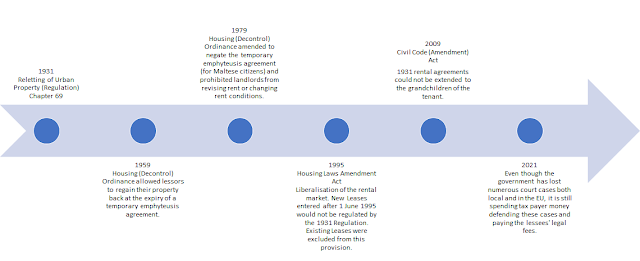Malta’s Unjust Rent Laws
The Government of the Republic of Malta, a member state of the European Union, is unfairly targeting a small group of citizens by forcing them to rent out their properties at below market rates. Below is the opinion of the European Court in the Case of Buttigieg and Others v. Malta; Application No 22456/15 (http://hudoc.echr.coe.int/eng?i=001-188275):
“The
Court has previously held that in a situation where the applicants’ predecessor
in title had, decades before, knowingly entered into a rent agreement with
relevant restrictions (specifically the inability to increase rent or to
terminate the lease), the applicants’ predecessor in title could not, at the
time, reasonably have had a clear idea of the extent of inflation in property
prices in the decades to follow.“
It also affirms that:
“Furthermore,
those applicants, who had inherited a property that had already been subject to
a lease, had not had the possibility to set the rent themselves (or to freely
terminate the agreement). It followed that they could not be said to have
waived any rights in that respect.
Accordingly,
the Court found that the rent-control regulations and their application in
those cases had constituted an interference with the applicants’ right (as landlords)
to use their property”
History
The 1931 law titled “Reletting of Urban
Property (Regulation) Chapter 69” was originally enacted to ensure a decent
supply of housing at reasonable prices since, at the time, it was common for
people to rent rather than purchase property. This was part of a drive to
ensure that the limited stock of vacant properties would not be left unoccupied
given the high demand. A Rent Board was
established and was given the right to seek out vacant properties and rent them
out. 1914 was chosen as a baseline for the setting of fair rent.
Many property owners were forced into
renting out their vacant properties because failure to do so would result in
them being reported to the Rent Board. It was common practice for persons to threaten
the owners of vacant properties to either sell or rent the property to them or
next of kin; less they report the owner to the Rent Board. Many people
reluctantly either sold the property or rented it out when threatened with such
action.
The Second World War came and went and the
country’s economy and social well-being started improving. The governments of the time did their part to
increase the stock of social housing and a number of ordinances related to the
1931 law were issued. The 1959 Housing (Decontrol) Ordinance was one that
allowed lessors to regain their property back at the expiry of a temporary
emphyteusis agreement. This became the type of rental contract lessors started
enacting with lessees. All parties were clearly aware that on expiry of the
agreed time-frame the property would revert to the landlord.
The spanner in the wheel was thrown by the
1979 Ordinance that technically nullified the expiry clause of pre-agreed
contracts if the lessee was a Maltese national. With this ordinance the lessee
could not be evicted and landlords were severely restricted in their ability to
adjust rents or conditions in the rental agreements that were never intended to
not have a termination. One grievance was the fact that it became possible for
relatives of the lessee to inherit the rent with identical conditions to the
lessee who had preceded them.
In 1995, the government passed legislation
to liberalize the rental market. Rather than enact legislation in which all
lessors would be treated equally, it only liberalized new contracts entered
into after 1st June 1995. For
new leases after June 1995, the parties were able to negotiate market price
rates, have a predefined rental duration, have clauses that prohibited
subletting and could include clauses to adjust rates. Pre-1995 had none of
this; the properties still earned rent established years before, and had no
protection against subletting or the automatic transfer to relations of the
original lessor at the same rent as those who had been occupying the property
before them.
In 2009 a revision extended the same 1931
conditions so that they would not extend to the grandchildren of the original
tenant, yet it did not address properties that had already passed to the
grandchildren. This legislation means that there are current property owners
who will not be able to take ownership of their property before the next
century. Today there exist property
owners who have never been able to access such properties and some never will
during their lifetime.
Why is the Maltese Rental unjust?
The 1995 legislation created an anomaly
because it differentiated between pre and post 1995 lessors; clearly favouring
the latter while burdening the former with responsibilities that should be
carried by society as a whole and not by a targeted group of people.
It also differentiated between lessees.
Lessees in pre-1995 rents clearly benefited over those who had to pay market
rates. The extent of unfair benefits to pre-1995 lessees was further aggravated
because siblings, children and grandchildren inherited benefits not afforded to
other lessees who would take a [post-1995] lease contemporaneously.
Another legal bias against landlords was an
ordinance which nullified a pre-agreed temporary emphyteusis. For all intents
and purposes, it was a dictator-style law that completely disregarded any plans
and aspirations landlords might have had for their property after the
contracted termination of the lease.
Landlords are the victims
From appeal No 22/19 GM (Joseph Grima,
Georgina Grima, u Doreen Grima v. L-Avukat Ġenerali u Lawrence Aquilina u Iris
Aquilina) a property valued at Euro 275,000
by a court appointed architect was earning the landlords Euro 205 per
annum because rent could not be adjusted. Furthermore, this amount is taxed,
meaning that the net earnings for the landlords is even less.
While receiving a pittance for such
properties, any person who inherited such a property would pay property
inheritance tax on the property’s current valuation and based on the assumption
that it is vacated.
All structural repairs must be borne by
landlords. The law allows an increase of 6% on base rent. For a baseline rent
of Euro 185 this would amount to Euro 11.10. Many do not justify the legal and
architectural fees necessary to process this request and end up simply carrying
the costs themselves without passing them on to the lessee. On properties that
are so old, maintenance costs are frequent and extremely costly because of the
materials and construction techniques used at the time. One such expense could
easily wipe 25 years of rent.
Landlords impacted by pre-1995 legislation
are not Malta’s version of Jeff Bezos or Elon Musk. They are people who, in
their absolute majority, fall into the low and middle-income tier. Many of them
acquired or inherited the properties that were originally purchased decades
ago. As can be seen in the chart, the price of real estate was a fraction of
what it currently retails at. These are people who live an average lifestyle
and whose children had to take mortgages or pay commercial rent rates for their
own habitation. These are people who may have a small seaside property but are
unable to use it for their own enjoyment.
If they need additional income, they cannot
rely on the market value of the property because, with tenants paying rent that
is a fraction of the true market value, this is very low. The equity of any
property with an incumbent that cannot be evicted and who is paying unrealistically low rates is as low as
it can get. There have been cases, many undocumented, in which landlords were
forced into selling such properties at dirt cheap prices when they are in dire
straits, such as requiring money to help out their children, cover medical
expenses, fund a project or to cover costs related to the property itself
(paying inheritance tax or paying for structural repairs). There have been many
stories of tenants who would squeeze the price to ridiculous prices when they
would realise that the landlord is in a bind and that they practically hold all
the negotiation cards. Aging landlords whose source of income is, for example,
a pension, do not have the financial, physical and mental strength to battle
incumbent tenants. There are no official documents that describe these events
because, from a legal perspective, the contract was voluntary and does not document
the justification as to why something is sold at a ridiculous price.
The right way to govern
The government should not see the pre-1995
landlords as enemies. It should not attempt to drive public opinion against
them and should not tell tenants in such properties that when some of these
landlords try to seek legal remedy it will carry their legal costs and will, as
has happened, end up assuming liability for any penalties imposed by local and
European courts.
The government should stop trying to sell
the story that those currently occupying the properties are victims; for
starters a proportion of them are not the original tenants; they simply
inherited a good thing at the detriment of other members of society and are
simply riding this unjust wave. Secondly
since 1995 (and in many cases much longer than that) these tenants, like almost
every other member of society, should have made plans, and through hard work
and sacrifice planned their future rather than relied on a government leeching
other members of the same society. Thirdly lessees that had a contractual end
of lease are the victims of legislation that, as has been deemed in many legal
challenges, is abusive.
The way the government attempts to justify its behaviour (and make property owners look bad) is to project tenants as being “frail little old widows”. While it is not universally true, in 1959, 1979 and 1995 many of these would have been virulent spring chickens. If the government truly respects all members making up the Maltese society it should develop projects funded through taxation, rather than abuse a subset of society and target it to, single-handedly, do its work.
Conclusion
It is clear that the Maltese government has
no intention of lifting a finger to right this injustice. Landlords caught up
in this conundrum need to stand up to fight for their rights. Those who have
the resources should challenge in the various courts. Irrespective of
resources, an association to represent lessors’ needs to be set up and
supported. This organisation will be able to look at the options that can be
taken, direct coordinated campaigns and push the cause at the European level.
It is appropriate to conclude with the
Article 1 of Protocol No 1 of the European Court of Human Rights (https://www.echr.coe.int/Documents/Guide_Art_1_Protocol_1_ENG.pdf).
This has article has been referenced in many Maltese rent related court cases:
“Every natural or legal
person is entitled to the peaceful enjoyment of his possessions. No one shall
be deprived of his possessions except in the public interest and subject to the
conditions provided for by law and by the general principles of international
law.”





Comments
Post a Comment